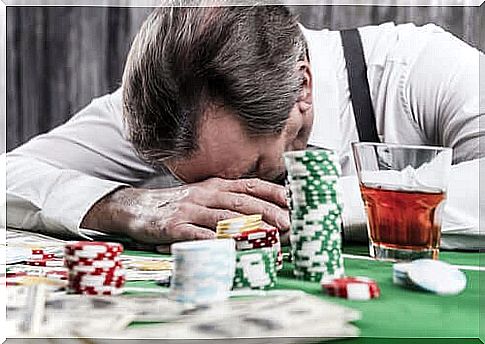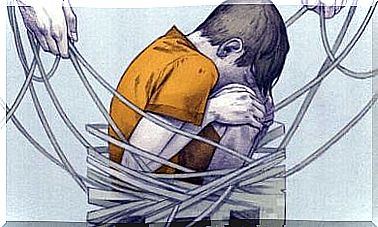Cognitive Distortions Of Pathological Gamblers

Cognitive distortions are very frequent cognitive biased treatments. When we talk about mental disorders, such as those suffered by pathological gamblers, they acquire even more importance, because in many cases they are at the origin or among the factors that feed them.
Gambling is one of the most primitive activities out there. In human history, it is possible to find names of famous characters obsessed with the game. Emperor Claudius, Dostoevsky and the conqueror Casanova would be some examples.
When we talk about pathological gambling, we are referring to games that involve luck. Therefore, video games would not fall into this category, although that does not mean that they are not addictive.
The pathological gambling to which we are going to refer is characterized, according to diagnostic manuals, by a loss of control over the act of gambling and by the establishment of a relationship of dependence. The patient continues to play, even knowing that this has negative consequences.
Currently, pathological gambling is no longer classified as an impulse control disorder to integrate with the DSM-5 addiction disorders, because it shares many characteristics with the latter.

Cognitive Biases of Pathological Gamblers
Pathological gamblers harbor certain irrational beliefs or cognitive distortions in their minds that keep them addicted to gambling.
Cognitive distortions are biases we incur when processing information. They are not necessarily pathological, as we all have them to a greater or lesser degree. However, we must modify them when they are too frequent and prevent us from moving forward.
These distortions typical of pathological gamblers are as follows:
- Illusion of control. It is the belief that the results of the game depend more on the activity itself than on chance. The person really thinks that, on his own, he is able to control the plays and their results. For example, a pathological gambler might say, “I have a foolproof method of winning.” He comes to believe in this bias, which logically keeps him playing.
- Adjustment to absolute frequencies. A person measures success in the game by looking only at the gains he has made, not counting the losses. The most normal is that the pathological gambler has lost much more than he gained, but this bias protects him from reality and keeps him anchored in addiction.
- Illusory superstitions or correlations. They are accidental associations between a certain event or behavior and a prize, in such a way that the player comes to believe that the event increases the probability of winning. It is similar to wearing an amulet or performing a certain ritual. Obviously, this is magical thinking, because we know that the pathological gambler cannot control whether he wins or loses with his actions. An example of this cognitive distortion might be: “If I roll my dice backwards, I get higher scores.”
- Machine impersonation. Some pathological gamblers attribute animated characteristics to the machines or objects they usually play with. A patient might say to himself: “The machine is deceiving me, it wants to confuse me, but it won’t do it. I have her.”
How to help the player to overcome their cognitive distortions?
The first step is to make the pathological gambler notice the distortion.
Cognitive biases are not easy to detect because they have been automated over time. One way to detect them is to ask the ludopath patient to fill out a self-registration when they feel like playing. If we explain correctly and the patient does it correctly, he will be aware of the cognitive distortions he commits.
To do this, we can show the most common biases committed by patients with ludopathy and ask which one or which they identify the most. Once this is done, it is necessary for the person to understand that, to a large extent, these cognitive distortions are responsible for him/her to continue playing.

To change them, it is important to question them and replace them with thoughts based on objectivity and reality. This is done through Socratic inquiry and guided discovery.
The patient wonders what evidence or evidence he has to support this thought. “How am I so sure my method is foolproof? Is winning or losing really up to me? What is the evidence?”.
After practicing Socratic dialogue with oneself and noticing these filtering errors, one will be more willing to change that way of thinking. To do this, you must review all the questions that were asked and give a rational answer, which from now on will be your mental mantra.
For example: “I don’t have control over a machine that runs randomly”, “Sometimes I won, but the data says I lost a lot more. It doesn’t pay.”
With practice, the player becomes aware of the uselessness of his behavior and that his problem only generates new problems: financial, family or professional. Thus, it is expected that the person ends up losing interest and abandoning the game.









